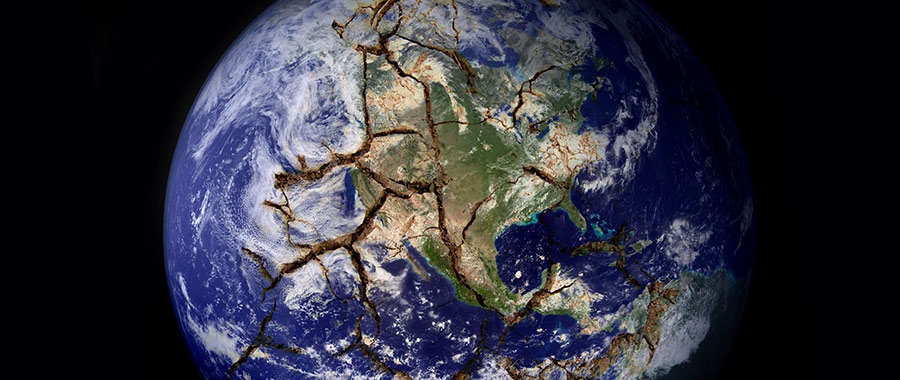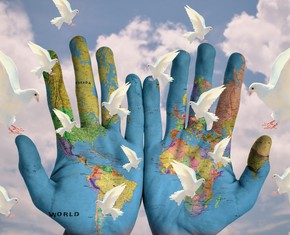The views expressed in our content reflect individual perspectives and do not represent the authoritative views of the Baha'i Faith.
Many people—all over the world—struggle against the destructive impacts of changes in climate resulting from the warming of the Earth.
People in the Philippines and Puerto Rico, for example, have experienced extremely heavy storms, and both rural and urban populations face increasing water scarcity in Africa. Floods, droughts and wildfires happen more frequently and with greater severity.
Of course, scientists have warned us for quite some time about climate disruption and its existential threat to humankind—and countless other forms of life. We can adequately address climate change, but we will need to fundamentally transform our thinking and almost all human activities: we must switch to renewable energy, eat much less meat, and alter our agricultural practices and transportation systems.
Perhaps the most difficult change will involve giving up the myth of continual economic growth. Wealthy individuals who live a high-consumption lifestyle will need to adopt a simpler one, while our societies will have to ensure that all people, particularly those populations now living in poverty, can access clean water, food, and electricity.
Although the vast majority of the world’s scientists and peoples agree on the causes of and solutions to climate change, in some countries skeptics express measured concern over the issue, while at the same time, powerful, vested interests fuel an extreme perspective that denies climate change and seeks to contend with relevant scientific findings. Given the polarization which has come to characterize this issue, some individuals have written to the Universal House of Justice, the supreme institution of the Baha’i Faith, expressing their concern that the issue of climate change has become overblown and politicized.
The response from the Secretariat of the Universal House of Justice lovingly clarifies several aspects of the issue. Early on, it advises abandoning partisan debate and seeking out unified action:
Humanity would be best and most effectively served by setting aside partisan disputation, pursuing united action that is informed by the best available scientific evidence and grounded in spiritual principles, and thoughtfully revising action in the light of experience. The incessant focus on generating and magnifying points of difference rather than building upon points of agreement leads to exaggeration that fuels anger and confusion, thereby diminishing the will and capacity to act on matters of vital concern. – The Universal House of Justice, 29 November 2017, to a group of individual Baha’is.
After setting this important unifying tone, it proceeds to affirm the truth that the problem of climate change has “profound implications for the common good.” It also puts the climate crisis into the broad picture of humanity’s social and environmental problems, with an emphasis on justice:
One of the most pressing problems of humanity in the current century is how a growing, rapidly developing, and not yet united global population can, in a just manner, live in harmony with the planet and its finite resources. – Ibid.
The letter then demonstrates the fundamental significance of science:
Among the Baha’i teachings are those concerning the importance of science. “Great indeed is the claim of scientists … on the peoples of the world,” Baha’u’llah observed. Abdu’l-Baha wrote that the “sciences of today are bridges to reality” and repeatedly emphasized that “religion must be in conformity with science and reason.” – Ibid.
The message elaborates on this important point by addressing climate science specifically, noting the “striking degree of agreement among experts”:
Scientific inquiry into the question of human contributions to global warming has gradually unfolded over a century of investigation and, more recently, with intense scrutiny. While there will naturally be differences of view among individual scientists, there does exist at present a striking degree of agreement among experts in relevant fields about the cause and impact of climate change. Sound scientific results, obtained through the employment of sound scientific methods, produce knowledge that can be acted upon; ultimately, the outcomes of action must stand the test of further scientific inquiry and the objective facts of the physical world. – Ibid.
The letter also points to the 2015 Paris Climate Agreement as an important step toward humanity achieving unity of thought on global issues:
But while there may indeed be a localized and highly charged political component to the public discussion, more remarkable is the fact that at a time when nations have difficulty reaching agreement on many important issues, the governments of nearly every country on earth have reached political consensus on a joint framework, in the Paris accord, to respond to climate change in a manner that is anticipated to evolve over time as experience accumulates. More than a century ago, Abdu’l-Baha referred to “unity of thought in world undertakings, the consummation of which will erelong be witnessed.” The recently adopted international agreement on climate change, irrespective of any shortcomings and limitations it may have, offers another noteworthy demonstration of that development anticipated by Abdu’l-Baha. The agreement represents a starting point for constructive thought and action that can be refined or revised on the basis of experience and new findings over time. – Ibid.
This important missive concludes with encouragement for all:
The House of Justice trusts that, in pursuing the many facets of their work of community building, social action, and involvement in the discourses of society, individuals, communities, and institutions will continually grow in their capacity to make a distinctive and effective contribution to addressing the multitudinous problems afflicting society and the planet, including those associated with climate change. – Ibid.
If you would like to develop your own individual capacity in this way, I warmly invite you to take part in the upcoming online course “Climate Change” offered by the Wilmette Institute from April 1 through May 26, with scholarships available. This course will empower you to understand the causes and impacts of climate change, discuss its ethical challenges, and relate them to the spiritual teachings of the world’s religions—especially those of the Baha’i Faith. It will help you consider changes of habit that will bring greater coherence to your life and show you how to practice environmental and social responsibility in your community. Everyone is welcome!
It will also assist you to elevate discourse above the level of partisan politics by introducing into your conversations spiritual responses to the climate crisis. Course activities include readings, videos and interaction with others in an international classroom setting. Neither massive nor impersonal, this course will give you access to a personal mentor, and all active participants will be able to get to know each other.
The course draws on inspiration from the Baha’i teachings, while maintaining an interfaith spirit and accepting people of all faiths or no faith. For indeed, we fully and wholeheartedly recognize that this enormous global problem requires all of us—of whatever background, culture, and belief, and regardless of our knowledge and capacity—to work together to solve it.
You May Also Like
Comments

















Thank you for your comment. I sent you the 29 Nov. 2017 letter of the Universal House of Justice by e-mail. In case, anyone else is interested: Much of the letter is published on the website of the Baha'i-inspired International Environment Forum here: http://www.iefworld.org/UHJcc2017 You can also read about some aspects of justice in the interfaith study course Scientific and Spiritual Dimensions of Climate Change also posted by IEF. Go here http://www.iefworld.org/ssdcc0.html and check out Class 7, Section 1.